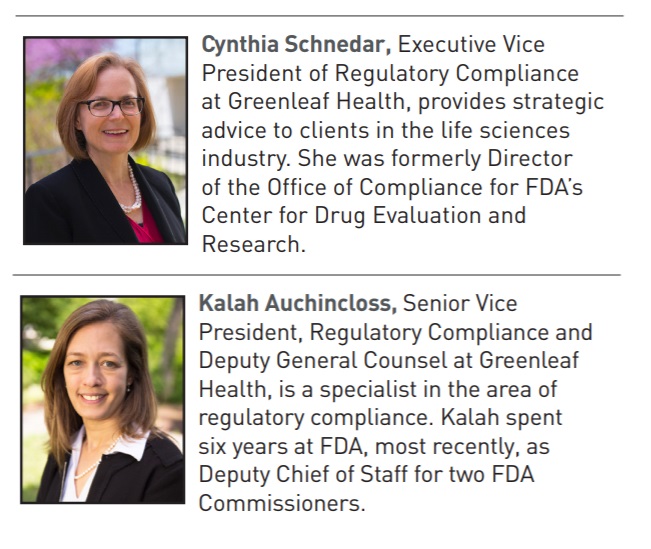
Communicating with FDA When Data Integrity Issues Arise During Clinical Trials
by Cynthia Schnedar and Kalah Auchincloss

Data integrity is frequently the topic of presentations concerning pharmaceutical manufacturing, but it also is critically important in the context of clinical trials. Good Clinical Practice (GCP) data integrity issues can at times be more crippling to a company than Good Manufacturing Practice (GMP) data integrity issues. In the worst-case scenario, where GCP data integrity issues are severe, it can lead to FDA completely rejecting the data submitted in new drug applications, supplemental drug applications, and abbreviated new drug applications. This can significantly set back the clinical development program for the study drug, costing the sponsor substantial time, money, and reputational credibility, not to mention delaying patient access to new drugs. Sponosors who discover these data integrity issues mid-trial may be perplexed as to when and how to engage with FDA concerning these issues. This article discusses both the regulatory obligations governing when a sponsor must report significant data integrity issues that it discovers pre-submission, and also the advantages of early disclosure of data integrity issues to FDA even when no early disclosure obligation exists.
Consequences from Data Integrity Issues in Clinical Trials Can Be Costly
A very high-profile example of the costly consequences from data integrity issues in clinical trials occurred in 2015 when FDA inspected Semler Research Center Private Limited (Semler), a Contract Research Organization (CRO), at its bioanalytical facility in Bangalore, India. At that inspection, FDA found documentation indicating subject plasma samples were substituted or manipulated in order for studies to meet the bioequivalence criteria—a serious data integrity violation. In addition to sending an untitled letter to Semler in 2016, FDA issued a notification to sponsors that any clinical and bioanalytical studies conducted at Semler were “not acceptable as a result of data integrity concerns” and needed to be repeated using an entity other than Semler.1 In addition, the European Medicines Agency (EMA) relied on the FDA inspection and on a World Health Organization (WHO) inspection with similar findings in determining that the studies conducted at Semler could not be accepted in marketing authorization applications in the European Union (EU).2
Semler subquently filed a lawsuit seeking damages from FDA, claiming that FDA’s action violated the Fifth Amendment and intentionally inflicted financial distress. That lawsuit is still pending3, but whatever the ultimate outcome is of the case, it will be of little comfort to the sponsors who were told in 2016 to repeat at another entity the studies they had already conducted at Semler.
While significant data integrity issues at a CRO can obviously cause headaches for a sponsor, a significant data integrity issue with a single employee at a single study site can also cause major problems for a sponsor. In 2015, FDA permanently debarred Wesley A. McQuerry, a clinical trial study coordinator who was convicted and sentenced to three years in prison for submitting false statements concerning a clinical trial. Mr. McQuerry created 15-20 fictitious patients; reported false test results by substituting his own blood, stool and EKG results; and then pocketed over $2,300 in gift checks while claiming he had distributed the money to the fictitious patients. While Mr. McQuerry stole $2,300 for his own profit, the pharmaceutical company conducting the trial reported to FDA that Mr. McQuerry’s conduct cost it over $200,000.4 In addition, the prinicipal investigator faced discipline from FDA for negligent supervision of the trial coordinater, and ultimately was required to undergo additional monitoring of his research for a three-year period.5
While these are dramatic examples of misconduct, even less dramatic examples of data integrity issues can result in complications for a company’s pending drug approval. As we explain below, when data integrity issues arise, FDA may require the company to undergo extra steps to demonstrate the reliability and validity of the data. These extra steps can result in delays in a drug approval, which can be costly to the company and which can hamper patients’ access to an improvement in their medical care.
FDA Will Evaluate the Reliability of Clinical Trial Data
To address data integrity concerns, FDA recently joined with the U.K. Medicines and Healthcare products Regulatory Agency (MHRA) to host a workshop entitled Data Integrity in Global Clinical Trials – Are We There Yet?” (Workshop).6 For FDA, the workshop was led by the Office of Scientific Investigations (OSI), which is the office at FDA responsible for ensuring the validity of clinical trial data, within the Office of Compliance (OC) in FDA’s Center for Drug Evaluation and Research (CDER). The first day of the two day workshop is available on line, and is highly recommended viewing to gain insights into how both FDA and MHRA view and react to data integrity issues in clinical trials.
At the Workshop, David Burrow, PharmD, JD, Director of OSI, reminded listeners that data integrity means reliability, interpretability, traceability and the principles of ALCOA (attributable, legible, contemporaneous, original and accurate). However, Dr. Burrow acknowledged defining what data integrity means is not a black or white question; the issues that arise can fall on a continuum with shades of gray, and “the shades of gray are what drive the conversation.” Dr. Burrow also encouraged industry and stakeholders to engage with FDA in that conversation.7
At the Workshop, FDA presented a summary of the findings it found in the GCP inspections that CDER reviewed from 2015 to 2017. The most common findings for both clinical investigators and sponsors included failure to follow the investigational plan, inadequate and inaccurate records, inadequate drug accountability (clinical investigators only) and inadequate monitoring (sponsors only).8
Sponsors are aware that following an inspection, FDA will evaluate information from the inspection and classify the inspection into one of three categories: (1) No Action Indicated (NAI), (2) Voluntary Action Indicated (VAI), or (3) Official Action Indicated (OAI).9 Clinical Investigators, CROs, and sponsors typically dread receiving an Official Action Indicated (OAI) classification, the most serious of the designations, and worry about the consequences that may flow from that classification. An OAI designation usually means that the inspected entity must invest significant resources into correcting the objectionable conditions that FDA has identified, including any observed data integrity issues.
Most clinical investigators, CROs, and sponsors breathe a sigh of relief if an inspection does not result in OAI status. However, sponsors should be aware that classification as NAI or VAI does not necessarily mean that FDA will conclude that the data in the study is reliable—the investigator may have identified data integrity concerns that need to be addressed even if the inspection is not classified as OAI.
For example, in addition to providing a classification after a GCP inspection, OSI also prepares a Clinical Inspection Summary, which is in essence a report on the reliability and quality of the data. OSI provides the Clinical Inspection Summary to the Review Division in charge of reviewing the drug application to assist the Review Division in determining if the data in the application is reliable. The Clinical Inspection Summary may recommend that the Review Division and/or the sponsor take additional steps to assure the reliability of the data, and those recommendations can have an impact on the pending drug application, even if the inspection classification was not OAI.10
At the Workshop, FDA presented data from its review of 208 Clinical Inspection Summaries it had prepared during 2015 and 2016, and found that 37 (18%) had “important” GCP-related recommendations intended to address data integrity concerns. Those recommendations included: conducting a sensitivity analysis, conducting additional inspections, excluding data from a site, conducting a new study, and conducting an independent third-party audit.11 These are all recommendations that could delay an approval, cost the sponsor additional resources, and could even result in a rejection of the data.
Regulations and Guidances Provide Direction on Reporting Significant Data Integrity Issues
Unfortunately, a sponsor most often finds itself confronting these data integrity issues post-inspection, after FDA has discovered and surfaced the issues. Because most GCP inspections are triggerd by filing an application for approval of the drug, identification of data integrity issues post-inspection is often so late in the review process that corrective actions, as discussed above, result in lengthy delays in approval. It also frustrates FDA and calls into question the sponsor’s ability to adequately monitor its own trials and identify and correct, independently, data integrity concerns.
However, with a proactive Quality Management System and risk-based monitoring, the sponsor may discover significant data integrity issues on its own, prior to FDA inspections. Of course, the question that arises if data integrity issues are self-discovered, is when to report those issues to FDA.
In a recently-issued draft guidance concerning risk-based monitoring of clinical trials, FDA notes that significant issues identified through monitoring should be documented and communicated to certain relevant parties, including “FDA, when appropriate.”12 However, FDA does not further explain in this document what circumstances would qualify as “appropriate” for triggering a report to FDA.
Per ICH E6(R2)13, which has been adopted by FDA, when sponsors discover noncompliance “that significantly affects or has the potential to significantly affect human subject protection or reliability of trial results, the sponsor “should perform a root cause analysis and implement appropriate corrective and preventative actions.” The ICH guidance further instructs that if the trial is prematurely terminated or suspended, the sponsor “should promptly inform the investigators/institutions, and the regulatory authority(ies) of the termination or suspension and the reason(s) for the termination or suspension.”14 This ICH provision is consistent with the notification requirements imposed through FDA regulations.15 Thus, while it is clear suspension or termination of the trial requires the sponsor to notify FDA, sponsors are often perplexed about when to notify FDA when the protocol noncompliance issue is significant, but yet not so significant that it requires suspension or termination of the trial.
In the case of serious adverse events, FDA has both regulations and guidance detailing the sponsor’s duty to report serious adverse events that occur during a clinical trial.16 However, the FDA’s regulations are not so clearly defined concerning when the sponsor’s duty arises to report a serious breach of protocol that does not result in a serious adverse event, but may cause FDA to question the reliability of the data. Must the sponsor report the breach mid-trial, or can the sponsor wait to point out the data integrity issues after a full root cause analysis and implementation of corrective actions, so that the sponsor has an opportunity to explain how the issues were addressed and resolved?
Some guidance can be found in FDA’s Compliance Program Guidance Manual for Bioresearch Monitoring (“BIMO Guide”). The BIMO Guide states that non-emergency deviations from the investigational plan initiated by the investigator must be reported to FDA for approval prior to implementation if the deviation “may affect the scientific soundness of the plan or the rights, safety, or welfare of human subjects…”.17 In the case of emergency deviations made to protect the life or well-being of a subject, FDA must receive notice within 5 working days of the deviation. Id.
In 2010, FDA issued a proposed rule that would have required sponsors to report information indicating that any person has, or may have engaged in the falsification of data in the course of conducting a study.18 FDA subsequently withdrew this proposed rule in 2018 with little fanfare, stating that the rule was not needed to protect research subjects or to help ensure the integrity of clinical trial data.19 FDA noted that existing regulations require study sponsors to notify FDA when terminating a clinical investigator from participating in a clinical trial (21 CFR 312.56(b)) and institutional review boards are required to notify FDA when suspending or terminating approval of research (21 CFR 56.113). FDA further observed that, “based on our review of recent data, we conclude that we are receiving adequate notice of falsification of data, and we do not believe that adopting the proposed requirements would provide us with substantial additional information.”20
Advantages Exist to Early Reporting of Significant Data Integrity Issues to FDA
Nevertheless, when sponsors are still uncertain as to whether a data integrity issue will ultimately impact FDA’s determination as to the reliability of data, sponsors often will find that it is advantageous to report data integrity issues to FDA soon after discovery rather than waiting for FDA to discover the data integrity issue during an inspection. As we noted above, when FDA discovers the issue, it can delay approval and result in distrust of the sponsor. Self-discovery and subsequent early reporting, on the other hand, prior to the submission of an application, can help build a relationship of trust with the regulatory authority. Moreover, early reporting to FDA may also help a sponsor determine sooner, when it is more cost effective, what additional steps must be taken to assure FDA of the reliability of the data.
In the recent FDA-MHRA Workshop, Phillip D. Kronstein, M.D., Lead Medical Officer, OSI, presented a case study demonstrating what can happen when the conversation occurs later in the process, after submission of data to FDA and after inspection. In the example, the sponsor had submitted an NDA for a new molecular entity that was the first targeted treatment for a serious disorder. Through an inspection, FDA discovered that the audit trails for half the subjects were inadequate. The sponsor explained that its vendor switched databases midway through the trial to ensure compliance with GCP requirements. FDA found that the audit trails for the first half of the trial, if they ever existed, had not been transferred.21
Fortunately for the sponsor, rather than throwing out the data, FDA worked with the sponsor to salvage the data. FDA asked the sponsor to provide certified copies of the paper source records for the primary efficacy endpoint, which ended up being thousands of pages. FDA reported that “several dedicated OSI/FDA reviewers spent many hours each auditing the source records by comparing them to the data line listings provided by the sponsor.”22
Dr. Kronstein reflected that “we were pleased we could work together work with the sponsor to salvage the data. Our goal is to work together and get a drug approved but with reliable data.” However, Dr. Kronstein also noted that “we really wished the sponsor had disclosed this early on and we could have addressed this early on. Everyone was scrambling and it was just this close to becoming a CR [Complete Response letter delaying approval of the application] because we didn’t have enough time to review it.” He emphasized, “we’re here to work with you.”23
FDA’s clear message at this workshop was that it understands that errors will happen. It is how those errors are handled that in the end will determine the reliability of your data. Dr. Burrow noted in his introductory remarks at the workshop, “Data integrity is something that can never really be completed, there’s no finish line. That’s why we need to continue to have this conversation over the course of time.”24 However, as demonstrated by the case study Dr. Kronstein presented, it will be easier and more cost effective to have those conversations earlier in the process, rather than later.
In short, ensuring GCP data integrity is just as important as GMP data integrity. Unreliable clinical data can have siqnificant, and costly, consequences, ranging from additional site monitoring to rejecting the data entirely and failure to approve the product. Sponsors will benefit from implementing robust GCP Quality Management Systems that can identify potential GCP data integrity issues. Sponsors should also raise identified significant issues with FDA early in the process to maximize the chances of successfully resolving the issues with minimal delays in reviewing the application.
- Notification to Pharmaceutical Companies: Clinical and Bioanalytical Studies Conducted by Semler Research Are Unacceptable, April 20, 2016.
- EMA, Science Medicines Health, Semler Article 31 Referral, EMA/H/A-31/1443 (22 September 2016).
- Semler Research Center Private Limited v. United States Food and Drug Administration, et al., Case No. 2: 18-cv-00534, C.D. Cal.
- Wesley A. McQuerry: Debarment Notice, 81 FR 14862 (March 18, 2016).
- Patricia Callahan, FDA won’t disqualify HIV doctor from drug studies, Chicago Tribune, September 9, 2010.
- FDA Regulatory Education for Industry (REdi): FDA and MHRA Good Clinical Practice Workshop: Data Integrity in Global Clinical Trials, Are We There Yet? October 23-24, 2018 (Workshop)
- Workshop – Welcome and Keynote, October 23, 2018.
- Workshop, Good Clinical Practice Assessment of Data Reliability in Registration Trials, Kassa Ayalew, M.D., M.P.H., Supervisory Medical Officer, Division of Clinical Compliance Evaluation, OSI.
- The three classifications are: (1) No Action Indicated (NAI), which means FDA has not found any objectionable conditions or practices; (2) Voluntary Action Indicated (VAI), which means FDA has found objectionable conditions or practices, but not at a threshold to recommend action, although FDA may still send an informational or untitled letter; and (3) Official Action Indicated (OAI), which means the Agency has found serious objectionable conditions, at the threshold where regulatory action is recommended, and the Agency may send a warning letter or take other regulatory action. See FDA Field Management Directive No. 86, Establishment Inspection Report Conclusions and Decisions.
- Workshop, presentation by Dr. Ayelew.
- Id.
- See A Risk-Based Approach to Monitoring of Clinical Investigations, Questions and Answers, Draft Guidance for Industry, at 7, March 2019.
- ICH E6(R2) is the formative guideline on good clinical practice issued by the International Council for Harmonisation of Technical Requirements for Pharmacueticals for Human Use (ICH). FDA has published this ICH guideline in a guidance document. See E6(R2), Good Clinical Practice: Integrated Addendum to ICH E6(R1), Guidance for Industry, March 2018.
- ICH E6 s(R2) at 5.21.
- 21 CFR 312.56(b) (requiring sponsors to notify FDA when terminating investigator’s participation in a study) and 21 CFR 56.113 (requiring institutional review board to notify FDA when suspending or terminating approval of research).
- FDA Guidance for Industry and Investigators, Safety Reporting Requirements for INDs and BA/BE Studies, December 2012; see also 21 CFR 312.32.
- FDA Compliance Program Guidance Manual, 7348.811, Chapter 48 – BioResearch Monitoring, Clinical Investigators and Sponsor-Investigators, December 8, 2008, see also 21 CFR 812.150(a)(4).
- Reporting Information Regarding Falsification of Data, 75 FR 7412 (Feb. 19, 2010).
- Use of Materials Derived from Cattle in Medical Products Intended for Use In Humans and Drugs Intended for Use in Ruminants; Reporting Information Regarding Faslification of Data, 83 FR 49023, (Sept. 9, 2018).
- Id.
- Workshop, A Case Example of the Review of Audit Trails in GCP Inspections, Dr. Phillip D. Kronstein, M.D., Good Clinical Practice Assessment Branch, Division of Clinical Compliance Evaluation, OSI.
- Id.
- Id.
- Workshop, Welcome and Keynote, October 23, 2018.
Update Magazine
April/May 2019







